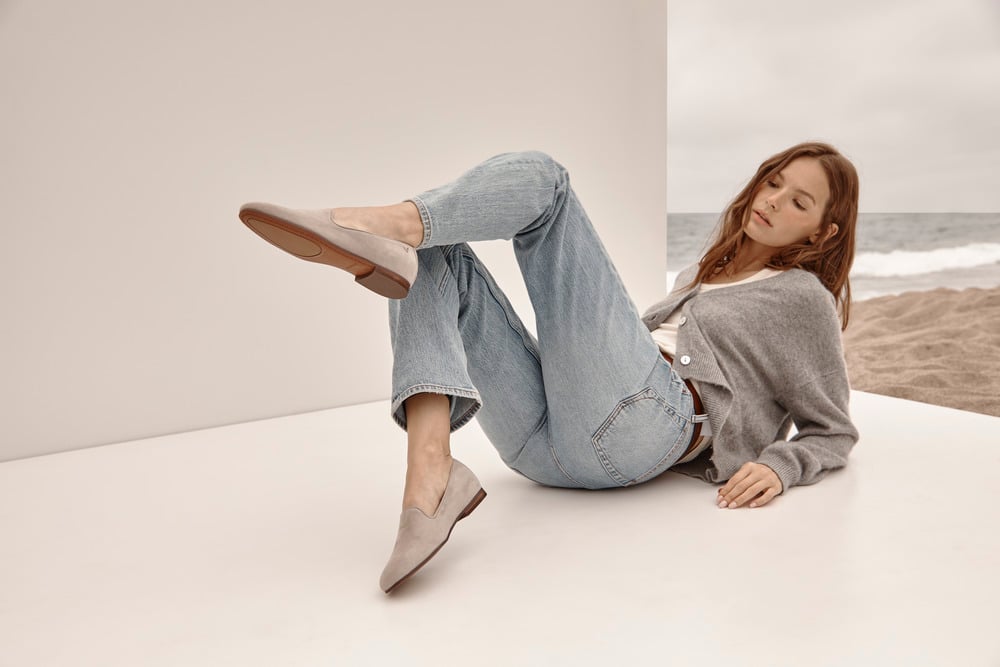
You may have heard the term “flat-footed” used to describe catching someone off guard, or someone who dances awkwardly (looking at you, Elaine Benice.) But “flat-footed” isn’t just an insult. It is, in fact, a real medical condition.
Whether you were born that way or the condition developed over time, it’s natural to wonder if flat feet contribute to other body aches and pains. For example, can flat feet cause knee pain?
Some studies show a correlation between flat feet and knee pain. But that doesn’t mean you have to suffer with every step—in fact, the solution may be as simple as wearing better shoes.
Let’s explore the condition of flat feet, the ways it can influence the joints and the carriage of the body, and how proper footwear can support your overall health and well-being.
What Does It Mean to Have “Flat Feet”?
The human foot is unlike any other in nature, and it’s all thanks to the arch. In fact, it’s this arch that gives us the power of bipedalism. Not only does the arch of your foot hold up all of your body weight, but it also provides just the right mix of flexibility, rigidity, and spring to carry our bodies forward.
Like many parts of the human body, the arches of our feet remain underdeveloped as infants. As we move around more, the various tendons and ligaments in our feet get stronger and more defined, creating a distinct arch. In most people, the arch of the foot is fully developed by six years old.
“Flat feet” means one or both feet have little or no arch. This condition, also known as pes planus, impacts almost 20% of the adult population. There are a couple of different types of flat feet, such as:
- Vertical talus – Some people have a birth defect that prevents them from developing arches altogether. In this case, the talus bone in the ankle is in the wrong position, causing the foot to bow like the legs of a rocking chair.
- Flexible flat feet – The most common type of flat feet, flexible flat feet affect up to 25% of adults. The arches of the feet are visible when sitting down but disappear when standing.
- Rigid flat feet – If you have no visible arches whether standing or sitting, then you most likely have rigid flat feet. This condition can be especially painful because it makes it difficult to flex your feet front to back or side to side.
- Fallen arches – Sometimes, in adulthood, the arches of the feet “drop” or “collapse.” This is usually due to injury, age-related wear, or conditions like arthritis.
- Overpronation – Every person sets their foot down differently. Sometimes the foot rolls out (called supination) or rolls inward (called pronation). Over time, your walking gait may cause your arches to flatten as you walk, which is known as overpronation.
Common Symptoms of Flat Feet
Though some people with flat feet go through life pain-free, others struggle. People with flat feet may experience:
- Pain behind the knee, where the lower and upper legs meet
- Cramping in the legs
- Foot pain, especially in the heel, Achilles tendon, or back of the calf
- Generalized knee pain
Flat feet can also be tied to certain medical issues, such as:
- Plantar fasciitis
- Shin splints
- Achilles tendonitis
- Arthritis
The Connection Between Flat Feet and Knee Pain
If you’ve found yourself wondering, “Can flat feet cause knee problems,” you aren’t alone. Though the correlation between flat feet and knee pain remains a mystery, it makes sense that the shape and dynamic movement of your feet can impact your overall gait and alignment.
Some studies are currently looking at ways that flat-footedness may cause knee pain, such as:
- Misalignment – Flat feet can cause the shin and the patella (your kneecap) to turn slightly inward, creating a knocked-knee effect and throwing your gain out of alignment. You may experience pain or additional wear and tear as your body attempts to compensate.
- Pressure on the MCL – The medial collateral ligament (MCL) is one of four primary ligaments in your knee. Its job is to connect the femur (your thigh bone) to the tibia (your shin bone) on the inside of the knee, providing stability and strength. The misalignment caused by flat feet can put extra pressure on the MCL, which could cause pain and make it more likely to tear down the road.
- Poor redistribution of weight – The arch of your foot acts like the shocks on a bike or a car: it makes the ride (or in this case, the walk) smoother by distributing the force evenly. That force can be up to five times your body weight. Fallen arches mean that the foot can’t absorb the shock properly, forcing other parts of your body—like your knees, ankles, and hips—to compensate. The force placed on your body by simply walking can cause your feet, ankles, knees, and hips to hurt.
Preventing Knee Pain When You Have Flat Feet
If you’ve been wondering, “Can flat feet cause knee problems,” then you’ve probably also wondered, “How do I prevent knee pain caused by flat feet?”
Your road to comfort starts with the best shoes for flat feet.
Proper footwear designed to give your flat feet the support they need can reduce joint pain and correct your gait and carriage alignment.
Choosing the Proper Footwear for Flat Feet and Knee Pain
There are a few different factors to consider when choosing the proper shoes for flat feet, such as:
- Arch support – It’s important to find a shoe that gives your feet full-contact arch support to reduce any pressure or additional stress. Good arch support can also help with overpronation and keep your foot stabilized.
- A reinforced heel – Another stabilizing factor is the heel of the shoe. For people with flat feet, a shoe with a sturdy, reinforced heel can keep the foot aligned properly and help protect the heel (and all of its corresponding tendons) from damage or excessive wear and tear. For example, Vionic’s bio-mechanically designed shoes, like the Bella Toe Post Sandal, feature a deep heel cup for ultimate stability.
- A firm sole – The best shoes for flat feet have a great deal of structure. They should keep their shape if you squeeze them and resist bending. A firm sole can also help keep your foot from rolling.
- Responsive cushioning – People with flat feet should look for shoes with highly responsive cushioning—in other words, cushioning that bounces back quickly when your feet are in motion. Responsive cushioning can help give energy back to you as you move. Consider a shoe like the Lucas II Lace Up Sneaker which features shock-absorbing Vio Motion technology.
Top-Performing Shoes for Flat Feet by Vionic
Flat footedness and knee pain don’t have to limit your shoe choices. Whether you work on your feet all day, need a new active shoe, or are looking for the right balance of comfort and style, there are plenty of fun (and functional) shoe options out there.
- For days at the office – The days of suffering in business casual shoes are over. Whether you’re looking for a cute ballet flat or a stylish loafer, Vionic’s timeless silhouettes with hidden arch support make a day at the office feel like a breeze. Take a look at Vionic Vitals like the Willa Slip On Flat or the Uptown Loafer.
- For walk abouts – From daily walks with the dog to walking tours overseas, a supportive walking shoe keeps your mind on your surroundings and not on your aching feet. Walk a mile (or five, or more!) in the 23Walk 2.0 Sneaker or the Walk Max Lace Up Sneaker.
- For recovery – If you work on your feet all day or enjoy an active lifestyle, then a recovery shoe can be a great addition to your self-care routine. A good recovery shoe offers extra cushioning and support to help reduce pain and soreness, decrease inflammation, and aid in circulation. Give your feet the R&R they deserve with the Tide RX Recovery Sandal. Alternatively, relax in cozy comfort with the Gemma II Mule Slippers or the Relax II Slippers.
- For everyday wear – Keep it cute and casual (or dress it all the way up) with a low-top sneaker designed for easy walking and ultimate support. Meet the Winny Sneaker.
- Make any shoe comfortable – Insoles are a great option for people with flat feet because they’re designed to provide the ultimate arch support. No matter the shoe or the activity, an insole can transform a shoe into something dreamy to wear. Explore Vionic’s durable orthotic insoles for essential support.
Give Your Flat Feet the Support They Need
People with flat feet, or fallen arches, may wonder if there’s a connection between their flat feet and their knee pain, ankle pain, or lower back pain. Though there’s still much to learn about how our feet impact our bodies, there does seem to be a strong correlation. Flat feet can cause misalignment in your legs, knocked knees, and may even contribute to conditions like plantar fasciitis or arthritis in the knees.
Thankfully, proper footwear can help give people with flat feet the stability, arch support, and cushioning they need to thrive.
Discover Comfort in Every Step With Vionic
From slip-on sandals to walking shoes, Vionic makes well-being wearable. With footwear designed to marry dynamic movement and grounded stability, every shoe is made to balance the whole you.
Vionic’s collections feature a number of styles, but they’re all powered by the same Vio-Motion technology. Vetted by podiatrists and built by bio-mechanics, Vio-Motion combines arch support, stability, flexibility, and cushioning to bring you footwear that moves with you.
Sources
YouTube. “The Little Kicks.” https://www.youtube.com/watch?v=jsl3IBAsEH4
Cleveland Clinic. “Flat Feet (Flatfoot).”https://my.clevelandclinic.org/health/diseases/17005-flat-feet
NCBI. “Flat Feet Are Associated With Knee Pain and Cartalige Damage.” https://www.ncbi.nlm.nih.gov/pmc/articles/PMC3087845/
The University of Queensland Australia. “Why human feet evolved arches–and what happens if you lack them.” https://habs.uq.edu.au/article/2020/02/why-human-feet-evolved-arches%E2%80%94and-what-happens-if-you-lack-them
Chris Bailey Orthopaedics. “Do flat feet cause knee problems?” https://www.chrisbaileyorthopaedics.com/blog/flat-feet-knee-problems/
Cleveland Clinic. “Medial Collateral Ligament (MCL) Tear.” https://my.clevelandclinic.org/health/diseases/21979-mcl-tear
University of Rochester Medical Center. “Are Feet at Fault for Back, Hip, and Knee Woes?” https://www.urmc.rochester.edu/encyclopedia/content.aspx?ContentTypeID=1&ContentID=1158
Health. “After Thousands of Hours of Testing, These Are the Best Shoes for Flat Feet.” https://www.health.com/style/shoes-for-flat-feet#toc-what-to-know-about-shoes-for-flat-feet
Medical News Today. “11 of the best shoes for flat feet.” https://www.medicalnewstoday.com/articles/best-shoes-for-flat-feet#how-to-choose-shoes-for-flat-feet


Leave a Reply